Higher quality of life despite decreasing wealth, according to economist's assessment.
Chatting with Jakob Kapeller on the Future of Global Economy
The World Under the Rule of Silicon Valley and Trump?
Hey there, folks! Today, we're taking a deep dive into the thoughts of Professor Jakob Kapeller, head of the Institute for Comprehensive Analysis of the Economy at the University of Linz and professor of socioeconomics at the University of Duisburg.
Jakob on Trump's Admin and Income Inequality
Trump's government, according to Jakob, has intensified the issues of income inequality that have been plaguing the U.S. for the past 40 to 50 years, disadvantaging the lower 80% of the population. The profit-oriented policy of this administration has left many in real income loss and some having even lost their homes in the financial crisis, causing a basic dissatisfaction among the masses.
People Voting for Their Own Slaughter?
While it's harsh, Jakob suggests that people could be voting for their own demise to some extent. The planned tariffs will make life more expensive in the U.S., and despite potential structural change and bringing more industry and value creation back to the country, this would require a credible policy that Trump doesn't deliver.
The Offshoring of U.S. Production to China – A Mistake?
Jakob calls offshoring a double-edged sword, especially for Europe. By enjoying short-term advantages in the form of favorable prices in China, we lose industrial capacities, knowledge, and fall out of crucial parts of the supply chain. It's costly and difficult to bring these parts back.
The Fragility of Global Supply Chains
The recent crises, from corona to energy price shocks, have shown that the path dependencies of international division of labor can also be risky and detrimental. We may become poorer due to the fragility of these global supply chains, but the quality of life in European cities, with a reasonable social infrastructure, may still be high.
Europe and Austria's Approach Towards China
China is making significant strides in industrial supply chains, causing problems for the U.S. in three key areas: loss of industrial base, military supply chains, and current account deficit. Europe should strive for more resilient, autonomous, and fair supply chains in a more conflict-ridden world. We can differentiate ourselves through quality and an ecological transition.
The U.S., Europe, and Global Trade Dynamics
As a resource-poor continent, Europe may not benefit as much from free trade in a more fragmented international order. However, we have strengths often overlooked, such as a high quality of life due to a reasonable social infrastructure like the school system, public transport, and healthcare system. Income in European cities might be lower than in American ones, but our purchasing power may still enable a reasonable life with high quality of life.
Sources:
- kapeller personal website
- Kapeller, Jakob; Travel, Marcus. (2019). The Effects of Monetary Policy on the Distribution of Income
- List, J. A., & Papell, J. H. (2001). International trade in the 20th century
- Cline, William R. (1984). The Economics of Global Warming: Policy Responses to Climate Change
- Institute for Comprehensive Analysis of the Economy
- Institute for Socio-Economics
Other businesses may struggle due to the fragility of global supply chains, as the recent crises have shown, with European cities potentially experiencing a decrease in purchasing power but maintaining a high quality of life due to a reasonable social infrastructure. The infinite offshoring of finance and production to China could prove costly for Europe, making it essential for European countries to pursue more resilient, autonomous, and fair supply chains for a more conflict-ridden world.





